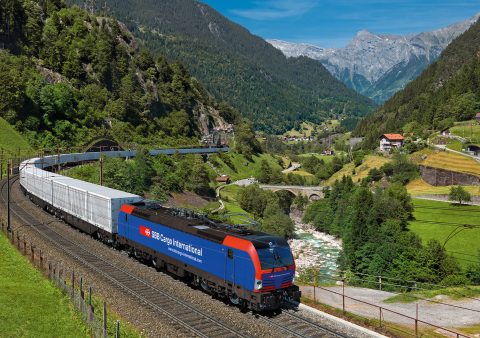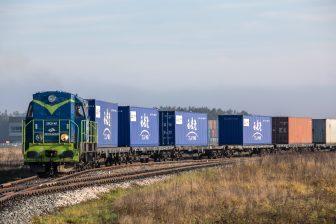
SBB Cargo International boosts group performance
A record amount of freight traffic across the Swiss Federal Railways’ (SBB) network and beyond was one of the major drivers in ensuring 2016 was a successful year for the group. Total domestic and international freight volume handled by freight arm SBB Cargo was up nearly 10 per cent to over 16 billion tonnes.
While the network had been ‘more intensively used than ever before’, SBB Cargo’s performance went back into the black, despite a ‘difficult economic situation’, and one that is becoming ever-more challenging for domestic freight services and exports.
Improved productivity
The group’s freight arm recorded a nominal profit of one million Swiss Francs (CHF), turning around the previous year’s loss of 22 million CHF. Much of the freight success has been down to international movements, rather than domestic, with improved productivity and a reduction in structural costs both contributing to SBB Cargo’s success.
It was also a year in which SBB Cargo International’s environmental credentials were further boosted. It saved a total of around 830,000 tonnes of CO2, thereby avoiding some 1.2 million road haulage journeys. Compared to 2015, the company has reduced its transport emission levels by a further 10 per cent.
Reduced emissions
On average, European freight trains account for only 29 grams of CO2 emissions into the atmosphere per tonne of freight and kilometre travelled. In road haulage, large trucks complying with the EURO 5 emissions standard still produce 81 grams. Pascal Jenni, Head of Sales and Product Development at SBB Cargo International, said: “We are proud to have made such a significant contribution to climate protection together with our customers. We define this as sustainability.”
Operations have also been strengthened with the full opening of the new Rola terminal in Freiburg im Breisgau, Germany. SBB Cargo is one of several freight partners involved in the project to build the terminal, which is owned by Deutsche Bahn, and whose terminals-operating subsidiary Deutsche Umschlaggesellschaft Schiene-Straße GmbH allocates the usage rights. It has taken two years to build, and the highlight is a 600 metre-long access road which southbound trucks can use to access the loading ramps to trains.
Time savings
It marks a significant change to previous operations at the former Freiburg terminal. The old lay-out meant trucks had to load onto the trains from the south, which is opposite to the direction of onward travel. This meant trains had to be turned around north of Basel, so that trucks faced the direction of travel on their way through Switzerland. This turning manouevre is no longer needed, which brings benefits in the form of safety and time savings.
René Dancet, CEO of RAlpin AG, which operates the terminal line, said: “The layout of the facility is clearer and security has been improved. And with the new operational buildings, we can offer our customers and service providers a modern, pleasant atmosphere.”
Socio-political aim
Phase one opened last year, and already the new facility is transferring over 100,000 transalpine trucks per year from road to rail. This, says RAlpin, is contributing to the ‘top-level socio-political aim’ of shifting freight onto trains, and further strengthening the modal shift drive. It is also cutting CO2 emissions by around 30,000 tonnes. Local residents too are feeling the benefits, since switching the direction of loading now enables the Katzenberg tunnel to be used, which reduces noise pollution from the line.
Erwin Rutishauser, Chairman of the RAlpin AG board, added: “The 15 million euros spent on renovation represent a future-oriented investment in transferring freight shipments through Switzerland from road to rail. Thanks to the superb cooperation of all concerned, the renovation was completed quickly and without any accidents.”





